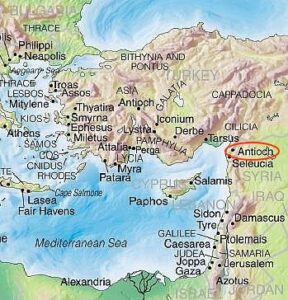 One of the Acts of the Holy Spirit recorded in the book of Acts was the first formal commissioning of missionaries from a local church. It was the church in (Syrian) Antioch, the church where the disciples were first called Christians (Acts 11:26). The commissioning of Barnabas and Saul is in Acts 13:2-3:
One of the Acts of the Holy Spirit recorded in the book of Acts was the first formal commissioning of missionaries from a local church. It was the church in (Syrian) Antioch, the church where the disciples were first called Christians (Acts 11:26). The commissioning of Barnabas and Saul is in Acts 13:2-3:
And when they were ministering to the Lord and fasting, the Holy Spirit said, “Set apart for Me Barnabas and Saul for the work to which I have called them.”
Then, when they had fasted and prayed and laid their hands on them, they sent them away.
Who is the “they” of verses 2 and 3? They are given in verse 1:
Now there were at Antioch, in the church that was there, prophets and teachers: Barnabas, and Simeon who was called Niger, and Lucius of Cyrene, and Manaen who had been brought up with Herod the tetrarch, and Saul.
That each of these men was either a prophet or teacher means that they were believers who had received a gift from the Holy Spirit that they were to use to serve one another in the church as a good steward of the grace of God, and so that God might be glorified through Jesus Christ (1 Pet. 4:10-11). It’s also instructive to consider these men as a functioning group of leaders in their local church. Barnabas was from the island of Cyprus. In all likelihood Simeon was called Niger because he was black and from Northern Africa. Lucius was from Cyrene, also in Northern Africa (Libya). Manaen, brought up with Herod the tetrarch, was probably the only one of the group from Palestine. Saul was from Tarsus, not far from Antioch, but on the Asia Minor coast of the Mediterranean. It’s a beautiful picture of the diversity of the early church – in contrast to the exclusiveness of the Jewish communities of the day. The church in Antioch believed and acted on the truth that all men are made in the image of God; and therefore the gospel, the indwelling and gifting Holy Spirit, the ministry, and dignity were for all men regardless of their cultural or ethnic background, skin color, social status, religious background, etc. Are we – individually and corporately – following this pattern of the church at Antioch? No wonder they were called Christians; i.e., of Christ!
